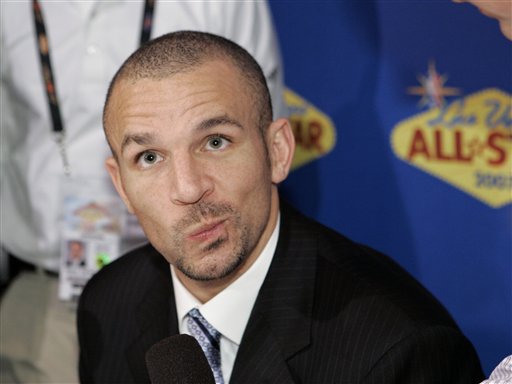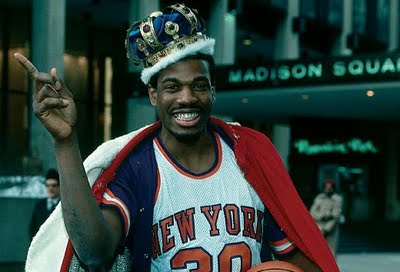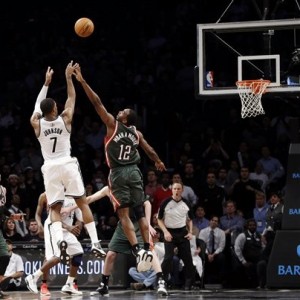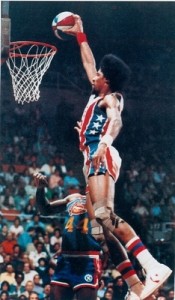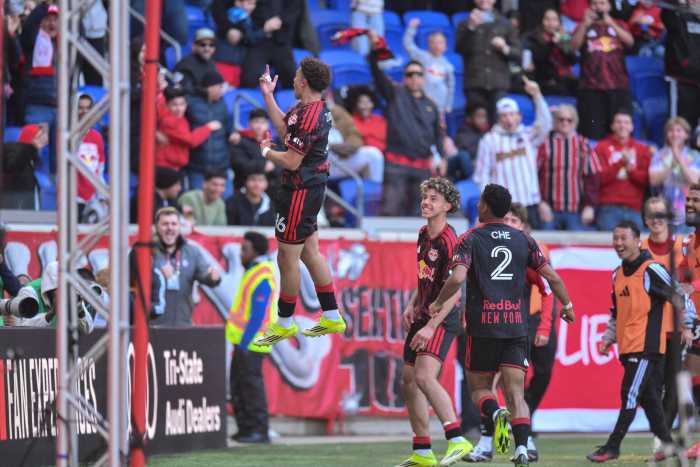It was the fall of 1992, and I was looking for a hero.
A few months earlier, the Dream Team had just blown through Barcelona and the Summer Olympics. Michael Jordan and the Chicago Bulls were about to start their campaign for their third consecutive NBA Championship. Some rookie out of LSU nicknamed “Shaq” was being compared to Wilt Chamberlin.
Up until that point, I had always been a casual fan of basketball. I would always watch a few games of the NBA Finals and I remember being captivated that winter when an HIV positive Magic Johnson was playing in the All-Star game. But the sport was always in my periphery until that fall, when it was clear to me that a lot of special things were going on in the NBA and I was missing out on something by not tuning in regularly.
Little did I know that it would be a Croatian sharpshooter with a million dollar smile and a competitive streak to match that would ultimately capture my heart and make me a true fan of both the sport and the Nets. That it would be the number “3” – not “23” or “34” – that would end up being sacred for the rest of my existence.
I’ve found myself lately thinking a lot about Drazen Petrovic for reasons both melancholic and silly. The former has been brought about by ESPN’s “Once Brothers” which aired this week as part of their “30 for 30” documentary series. The reviews for this episode, which deals with the kinship and politically-charged dissolution of Petro and Vlade Divac, have been universally glowing, and rightfully so. The Petro/Divac story, which meets a tragic end when Drazen was killed in an auto accident during the summer of 1993, is gripping regardless of your fandom for the players involved, or even the NBA.
As for the silly reminders, I was overcome with giddiness when I saw that Petrovic was going to be an unlockable player in the reinvigoration of the NBA Jam franchise for the Wii. When NBA Jam first hit the arcades in 1993, Petrovic’s inclusion was an accident brought about by poor timing. He was already programmed into the game before he died that summer. As a result, it always made me hesitant to play as the Nets. Don’t get me wrong, I still sunk hundreds of quarters into that arcade machine (I loved dominating with Spud Webb and the Kings) but never as the Nets. With his death being so far removed now, I feel a lot better about lining him up with Brook Lopez and dominating the league. It’s allowing me to love something a second time in a totally different way. How many people my age can say that about a video game?
But back to sentimentality. All of this talk about Petrovic lately is brings me back to the fall of ‘92. In a lot of ways, my connection to the Nets was born out of sheer coincidence and frugality by my parents. At the time, the MSG network, which aired the “local” team for a Long Island family, the New York Knicks, was a premium cable channel. MSG also broadcasted games of the hated Yankees. I lived in a New York Mets household, so asking my parents to order MSG, even if it was to watch basketball, not baseball, was scandalous.
So I settled on this team from New Jersey that played on Sports Channel, which my parents were willing to pay for (because it carried the Mets). Before the season started, I read in all the magazines about the Nets two young rising stars, Derrick Coleman and Kenny Anderson. Then I read about the Nets veteran coach, Chuck Daly. Drazen Petrovic, a career bench player when the Nets acquired him from Portland in 1991, seemed like an afterthought, despite averaging more than 20 points per game in 91-92 and more than 24 points per game in the playoffs that season.
But Petro was the player I instantly gravitated towards. He wasn’t some kind of athletic freak or playground legend like so many other players in the NBA. He was a shooter with a chip on his shoulder, completely unafraid to take on anyone. When he was thrust into a starting role with the Nets, Petro always carried himself like he belonged there – that those who doubted his ability to be on the court for 40 minutes a game would be forced to shut up once he caught a pass near the top of the three-point line and drilled a trey. The guy even had his own signature play-by-play call: I still get chills thinking of Sports Channel play-by-play man Spencer Ross saying (and if I misremember if this came from Ross or not, I apologize in advance), “Petro for three … Got it!” When you compare Petro to some of the other personalities on that 92-93 Nets team, Coleman, Anderson and Chris Morris – guys who were more less handed the keys to the car – is it any shock that I fell in love with the player who had to turn back all the clocks in his house, rifle through his mom’s purse and take off with the family car, just to get a chance to go out and make an impression in this league?
There’s a seminal Petro moment for me. Towards the beginning of December, 1992, the Nets were embroiled in an early season battle with the San Antonio Spurs. The Spurs were another one of those teams that had a true “superstar” player on their roster in David Robinson. But it was Petrovic who saved the game. Down double digits earlier in the game, Petro sank five three-pointers to get the Nets back into it. With 4.8 seconds left and the Nets down two, Petro got the ball and started to make his move towards the rim. As a young basketball fan, I remember watching the play unfold in slow motion thinking this guy was crazy – no way he’s going to be able to dribble the ball into the lane, split a couple of defenders and lay it in before time expires. But he did, and the Nets went on to win in overtime (and yes, I know I talked about this game in my Meadowlands post in April).
The box score showed that Kenny Anderson was the player of the game (31 points, 17 assists), but Petro was “the man” in my eyes (it helped that he also scored 34 points). Kenny A may have been the point guard of the future, but after that moment Drazen was the player I wanted to watch, the player I emulated when I would go the playground, step back behind the three point line and heave the ball (and likely airball it). It’s one thing to put up gaudy numbers and statistically be the best at your position. It’s another to carry your team on your back and seemingly defy the passage of time in order to win.
While people will point to a late February game against the Knicks as the negative turning point for the 92-93 season – the Nets were blowing the Knicks out on national television and in a move that was typical for thugs that played at the Garden, John Starks tackled Anderson on a layup and shattered his wrist, ending his season – the moment that broke my heart that year was when Drazen crumbled to the ground after injuring his knee in a March 22 game against the terrible Washington Bullets. The Nets went on to lose that game, and after spending most of the season fighting for the No. 4 seed in the Eastern Conference, the team began downward spiraling to the end of the season. Petro returned on April 14, but was not the same player he was earlier. The Nets went on to lose five of their last six games, and settled for a first-round match-up against the Cavaliers as the 6th seed – a match-up they would inevitably lose in five games. Petro average 15.6 points on 33 percent three-point shooting in that series. It fills me with regret that, because of what happened that summer, I never got to see the real Petro on the big stage. A healthy Petrovic would have beaten the Cavs. I’m nearly certain.
Lost in the Petrovic tragedy that summer was all of the rumors regarding his uncertain status with the team once the season ended. There was were some pretty significant rumors that Petro, who had become a free agent, was not going to return to New Jersey and would instead opt to play in Europe. It seemed absurd that a player with his potential for greatness would walk away from the biggest stage of all, but as the NBA Playoffs were rushing towards their big finish, the quietness on the Petro front was a little disconcerting for me as a fan. I was convinced that the relationship with my favorite player was going to be a one-year-wonder.
Then June 7, 1993 happened. I was up and getting ready for school when the local news report mentioned that Petro had died in a car wreck during its sports report. It felt like a passing thought coming out of the local anchor’s mouth. While watching 30 on 30 Tuesday night, the replay of the SportsCenter announcement coming from a very hairy Keith Olbermann, demonstrated more gravitas and tragedy, but unfortunately, that was not how the news broken to me. I was just confused by the whole thing. First there was the obvious state of disbelief. Then I started wrestling with how I was supposed to react to this news. Was this something to get emotional about? I didn’t know this guy, but I felt such a connection to him. Still, I don’t think I shed a tear about it because I would have felt stupid taking it so personally. I guess that’s what happens when you’re an 11-year-old boy and something like this happens – a lot of confliction followed up by a lot of nothing.
More than 17 years later, with all of these reminders of Petro in front of me, I can think a little more clearly about it. Petro’s death was obviously an excruciatingly tragic event. Just as I bemoaned his mediocre play after coming back from a knee injury in 1993 as a lost opportunity for the Nets, fans around the world were deprived the chance to see more from a very special player. With the influx of European players in the NBA, many of today’s fans likely missed out on seeing perhaps the best guard to ever come out from that continent.
As for me, while Petro’s greatness sold me as a Nets fan, I clearly have embraced this team since his untimely departure. Jason Kidd and Kenyon Martin may have brought me to my highest point as a fan when they were leading this team to back-to-back finals in 2002 and 2003, but it was Drazen Petrovic who made me think Ed O’Bannon and Yinka Dare were going to be stars, that Derrick Coleman was going to reach his potential, that Butch Beard was a good coach, that Armon Gilliam was a strong role player on a contending team, that John Calipari’s theatrics on the sidelines were inspiring his players, that Jayson Williams is just another misunderstood, tragic person, and that a Russian with bottomless pockets is going to turn a 12-win team around into a contender.
I’m sure if Petro was alive today and I told him this, he would view it as a dubious distinction, but I’ve always thought that vociferously following a team with such a sorry history as the Nets is the ultimate character builder. Maybe that’s why I always feel a link towards Petro – basketball should have been so much easier for us, but while we were fighting and clawing our way through it, dealing with rotten circumstance after circumstance we still got so much joy out of it.











